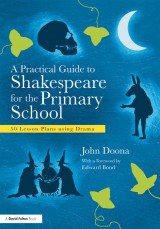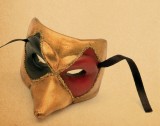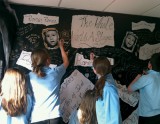Shakespeare is ours and we want him back, says John Doona, who has some practical suggestions on how drama lessons can reclaim him
Shakespeare is our key historical and literary icon. So often, however, he remains locked behind glass and difficult to reach. The distance is a terrible shame because, as they say, all human life is there, and because when the work emerged in sixteenth-century London it was a popular form, speaking to kings and illiterate peasants alike. Now, however, Shakespeare has been appropriated by a cultural elite and is generally regarded as ‘high art’.
Of course, in tackling big questions and exploring the edges of life, his work is ‘high art’ – but he is also a popular communicator; it is also ‘entertainment’. He asks questions and offers insight not of exclusive interest to a cultural elite, but of proper interest to us all; questions and insight central to what it is to be human. Shakespeare is ours and we want him back.
 The purpose of my book, A Practical Guide to Shakespeare for the Primary School (Routledge, 2012), is to unlock Shakespeare, to take him from his glass case and let him live amongst us again. To find a new form that will allow him to ask his questions of us, to challenge, to provoke, to rekindle a love of words, to show us the edges of things, and to share some rollicking good fun.
The purpose of my book, A Practical Guide to Shakespeare for the Primary School (Routledge, 2012), is to unlock Shakespeare, to take him from his glass case and let him live amongst us again. To find a new form that will allow him to ask his questions of us, to challenge, to provoke, to rekindle a love of words, to show us the edges of things, and to share some rollicking good fun.
In the book, there are four detailed schemes for The Tempest, Macbeth, A Midsummer Night’s Dream, and Romeo and Juliet, which lead to challenging and significant learning. It’s an approach that is perhaps as much about enlivening the school curriculum through drama as it is about rediscovering Shakespeare. But before launching into the schemes, we provide teachers with a crash course that prepares the ground for their extensive use of drama. The following suggestions are taken from this section of the book and demonstrate how drama is a powerful form of engagement and learning; helping teachers to both justify and better understand what it is they are looking to achieve.
 Rather than attempting a comprehensive statement for the case for drama… let’s pretend. Let’s rehearse four real-world arguments for our special kind of work; four ‘clinchers’. Imagine the following scenarios.
Rather than attempting a comprehensive statement for the case for drama… let’s pretend. Let’s rehearse four real-world arguments for our special kind of work; four ‘clinchers’. Imagine the following scenarios.
• The staffroom. Staff are scoffing at your need for the hall on Wednesday morning…again! A serious educational discussion ensues. What are you messing about at?
• The school office. A parent has come to see you. He is concerned that his child’s learning is being interrupted by ‘fashionable’ teaching approaches – your drama sessions.
• The head’s office. Your headteacher would like you to account for yourself; noise coming from the hall, lights dimmed, candles lit (heaven forfend!), classroom desks empty – again. She is willing to support you, but only if you can give a clear account of why it is necessary and how it promotes effective learning.
• The parents’ room – this week allocated to OFSTED. You bravely invited OFSTED into yesterday’s drama session on the mechanicals’ village life (from Midsummer Night’s Dream). It was a lively session…but they would like to discuss the impact on learning before deciding on a grade for your teaching.
The clinchers – which we propose you consider elaborating yourself in order to develop your own account of why drama is important to your classroom – have the headings: Engagement and motivation, Admitting the whole child, Social health, and Improving outcomes. The voice is yours!
 “I need children to care about their learning. Drama offers the possibility of making our learning tasks urgent. Pupils might ordinarily ‘care’ because it is simply good to do well, or to gain the approval of adults or the respect of their peers, but there is another possibility: they care because they have entered and accepted the urgency of a fictional situation; a drama has made our learning uniquely urgent. During the drama we will enter an imagined world. The compelling nature of simply being in a well constructed imagined world will seize my children’s attention. They will identify with fictional people and begin to feel as they feel, do as they do, to deal with the situations they need urgently to deal with. They will experience the tensions and problems of this ‘new’ world, facing jeopardy and dangers which are ‘beyond-real but safe’ – jeopardy that is more than we can generate here in the classroom in our real life, but safely contained within the fiction. Of course, making learning urgent and active means making learning fun and promoting enjoyment. Do we need to argue that children learn best the things that they enjoy… and that offer the gentle pressure of fictional urgency?”
“I need children to care about their learning. Drama offers the possibility of making our learning tasks urgent. Pupils might ordinarily ‘care’ because it is simply good to do well, or to gain the approval of adults or the respect of their peers, but there is another possibility: they care because they have entered and accepted the urgency of a fictional situation; a drama has made our learning uniquely urgent. During the drama we will enter an imagined world. The compelling nature of simply being in a well constructed imagined world will seize my children’s attention. They will identify with fictional people and begin to feel as they feel, do as they do, to deal with the situations they need urgently to deal with. They will experience the tensions and problems of this ‘new’ world, facing jeopardy and dangers which are ‘beyond-real but safe’ – jeopardy that is more than we can generate here in the classroom in our real life, but safely contained within the fiction. Of course, making learning urgent and active means making learning fun and promoting enjoyment. Do we need to argue that children learn best the things that they enjoy… and that offer the gentle pressure of fictional urgency?”
I want the children to consider a story from contrasting perspectives.
We have built Macbeth’s castle. We have walked its dank corridors. We have heard of the king’s murder and felt the presence of walking, bloody ghosts. We have trained as soldiers in the courtyard, and woven magic around fires as heathen witches. Now we will write as one of the soldiers seeing the trees of Burnham Wood approach; we will write as witches flying invisibly over the turrets, scoffing at the chaos they have brought; we will write as Macbeth’s forgotten child Lullach, seeing the world crumble around him as the English army approach.
The drama has offered us the possibility of experiencing the single literary event from a multitude of perspectives. We are ready to write. Each child’s experience has been shared within the group, but is also unique.
“All too often, our classrooms are simply ‘rational’ places; we honour the ability to recall, process, compute, spell, follow patterns, etc. These are valuable things – and good drama is also urgently rational – but they represent only a small part of the totality of what it is to be human. I want to allow children to bring into the classroom the neglected aspects of themselves as human creatures. When we exclude the possibility of our children as physical, emotional, imaginative, social beings, we not only impoverish the possibilities of their responses and unnecessarily exclude children whose strengths are elsewhere, we also limit their capacity to learn. Drama offers the possibility of being able to address the multiplicity of aspects that are all part of our human make-up. Drama makes our schools more human.”
Immortal spirits are drawn to the mortal human child. Titania, Queen of the fairies, has stolen a beautiful Indian child. King Oberon is desperate to have the child for his own, and an argument erupts that is so fierce it changes the weather.
Where is the stolen child? S/he is kept in a high hollow of a tree, guarded by a kindly fairy. The fairy promises to deliver a single letter to the child’s home. What note will the child write?
In this tender moment of drama, we acknowledge the schoolchild’s emotional life and invite an emotionally specific response: the schoolchild is offered the chance to explore, through analogous experience, their own fears of loss, abandonment, separation, perhaps drawing on experience of real estrangements, real ‘child-stealing’ incidents they may know of. The situation is at arm’s length; the response is real. The writing task is charged, meaningful and motivated by the fiction.
 “I want my class to be drawn together as a group. They are a diverse range of children, from a diverse range of backgrounds. There have been tensions between the sub-groups, with some hostility and unhappiness. Through this specific drama, I wish to look at the mechanisms of group formation and conflict – to explore the management of conflict and, importantly, to build a fictional analogous situation in which the whole group is forced to face an extreme jeopardy under the threat of a common enemy. I want the group to be the basic unit, and its members to demonstrate capability, resilience and perseverance through their shared experience of prevailing through community action. Drama is a deeply social activity; the rich shared experiences it offers are capable of transforming groups and building mutually supportive communities.”
“I want my class to be drawn together as a group. They are a diverse range of children, from a diverse range of backgrounds. There have been tensions between the sub-groups, with some hostility and unhappiness. Through this specific drama, I wish to look at the mechanisms of group formation and conflict – to explore the management of conflict and, importantly, to build a fictional analogous situation in which the whole group is forced to face an extreme jeopardy under the threat of a common enemy. I want the group to be the basic unit, and its members to demonstrate capability, resilience and perseverance through their shared experience of prevailing through community action. Drama is a deeply social activity; the rich shared experiences it offers are capable of transforming groups and building mutually supportive communities.”
Verona. Two houses, alike in dignity, are at war. Can we remember where the conflict began? Is it just something that has always been? Is there a way through it?
The families are drawn together through the shared grief of losing their youngest children – Romeo and Juliet.
Social learning: if conflicts go unchecked, they tend to escalate towards consequences that are far beyond the ‘wrong’ that began the conflict.
 “I want my children to be challenged. I believe that, through using a drama approach at key moments in the development of learning programmes, I can motivate, enrich and inspire more detailed, precise, insightful responses. Good drama is enjoyable and beneficial in itself; it is also a pretext for the enhancement of other educational outcomes.
“I want my children to be challenged. I believe that, through using a drama approach at key moments in the development of learning programmes, I can motivate, enrich and inspire more detailed, precise, insightful responses. Good drama is enjoyable and beneficial in itself; it is also a pretext for the enhancement of other educational outcomes.
“The medium of drama is language – sometimes it is the language of space or movement… but primarily it is the spoken word. The drama I share with my children gently forces them to use language in new ways, and gives them opportunities to expandtheir vocabulary; to deepen their responses; and to explore variant uses of language and the language of variant times, characters andplaces. When the situation has given them experience of the rich use of language, they are much more likely to transfer this new experience onto the page in more elaborate, accomplished and mature forms of expression.”
We ‘live through’ Caliban’s capture by Prospero, the banishment of his mother and his enslavement to his new master. We speak with his spitting, visceral voice, mixed with the Shakespearean idiom. We stand in his shoes, seeing the mighty Prospero lord it over the kingdom that he knows should be his.
We speak failed spells, express our anger, plot our revenges, devise our tortures, and dream of life when we regain our crown.
How do we achieve all this without expanded, elaborate, glorious, character-specific and moment-specific language? We can’t – we create it. The children will write ‘in-role’ and ‘for-role’.
We hope this brief tour of some ideas in support of the drama approach will ignite your interest and commitment. As your experience develops through these schemes, be alert to the impact of your work together. Gather your own ideas, your own examples and your own narratives. Be reflective and take your own thoughts seriously. Become an advocate; an expert. Keep a journal. Blog! Drama is a movement that has developed quietly through an accumulation of rich experience in the privacy of classrooms. It needs to be experienced, and that experience then needs to be shared in whatever forms we can muster.
John Doona is the creator and director of the Children’s Shakespeare Festival. He is a qualified AST with a wide experience of secondary and primary drama practice. His new book, A Practical Guide to Shakespeare for the Primary School is published by Routledge (£29.99, ISBN 978-0415610421).
Teaching Mandarin via video conference
Languages
Reorganise your music room
Ace-Music
